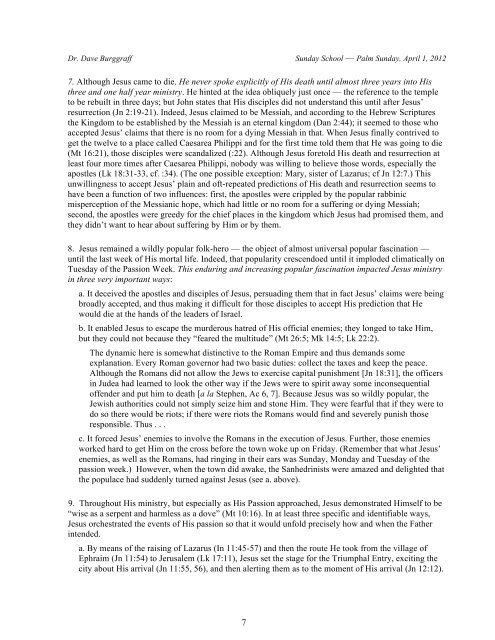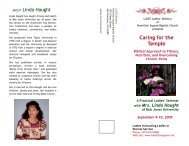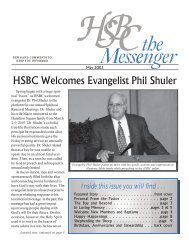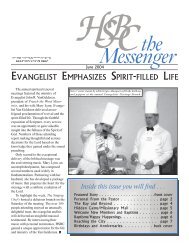Easter conference ~ april 1-8 hamilton square baptist church San ...
Easter conference ~ april 1-8 hamilton square baptist church San ...
Easter conference ~ april 1-8 hamilton square baptist church San ...
Create successful ePaper yourself
Turn your PDF publications into a flip-book with our unique Google optimized e-Paper software.
Dr. Dave Burggraff Sunday School — Palm Sunday, April 1, 2012<br />
7. Although Jesus came to die, He never spoke explicitly of His death until almost three years into His<br />
three and one half year ministry. He hinted at the idea obliquely just once — the reference to the temple<br />
to be rebuilt in three days; but John states that His disciples did not understand this until after Jesus’<br />
resurrection (Jn 2:19-21). Indeed, Jesus claimed to be Messiah, and according to the Hebrew Scriptures<br />
the Kingdom to be established by the Messiah is an eternal kingdom (Dan 2:44); it seemed to those who<br />
accepted Jesus’ claims that there is no room for a dying Messiah in that. When Jesus finally contrived to<br />
get the twelve to a place called Caesarea Philippi and for the first time told them that He was going to die<br />
(Mt 16:21), those disciples were scandalized (:22). Although Jesus foretold His death and resurrection at<br />
least four more times after Caesarea Philippi, nobody was willing to believe those words, especially the<br />
apostles (Lk 18:31-33, cf. :34). (The one possible exception: Mary, sister of Lazarus; cf Jn 12:7.) This<br />
unwillingness to accept Jesus’ plain and oft-repeated predictions of His death and resurrection seems to<br />
have been a function of two influences: first, the apostles were crippled by the popular rabbinic<br />
misperception of the Messianic hope, which had little or no room for a suffering or dying Messiah;<br />
second, the apostles were greedy for the chief places in the kingdom which Jesus had promised them, and<br />
they didn’t want to hear about suffering by Him or by them.<br />
8. Jesus remained a wildly popular folk-hero — the object of almost universal popular fascination —<br />
until the last week of His mortal life. Indeed, that popularity crescendoed until it imploded climatically on<br />
Tuesday of the Passion Week. This enduring and increasing popular fascination impacted Jesus ministry<br />
in three very important ways:<br />
a. It deceived the apostles and disciples of Jesus, persuading them that in fact Jesus’ claims were being<br />
broadly accepted, and thus making it difficult for those disciples to accept His prediction that He<br />
would die at the hands of the leaders of Israel.<br />
b. It enabled Jesus to escape the murderous hatred of His official enemies; they longed to take Him,<br />
but they could not because they “feared the multitude” (Mt 26:5; Mk 14:5; Lk 22:2).<br />
The dynamic here is somewhat distinctive to the Roman Empire and thus demands some<br />
explanation. Every Roman governor had two basic duties: collect the taxes and keep the peace.<br />
Although the Romans did not allow the Jews to exercise capital punishment [Jn 18:31], the officers<br />
in Judea had learned to look the other way if the Jews were to spirit away some inconsequential<br />
offender and put him to death [a la Stephen, Ac 6, 7]. Because Jesus was so wildly popular, the<br />
Jewish authorities could not simply seize him and stone Him. They were fearful that if they were to<br />
do so there would be riots; if there were riots the Romans would find and severely punish those<br />
responsible. Thus . . .<br />
c. It forced Jesus’ enemies to involve the Romans in the execution of Jesus. Further, those enemies<br />
worked hard to get Him on the cross before the town woke up on Friday. (Remember that what Jesus’<br />
enemies, as well as the Romans, had ringing in their ears was Sunday, Monday and Tuesday of the<br />
passion week.) However, when the town did awake, the <strong>San</strong>hedrinists were amazed and delighted that<br />
the populace had suddenly turned against Jesus (see a. above).<br />
9. Throughout His ministry, but especially as His Passion approached, Jesus demonstrated Himself to be<br />
“wise as a serpent and harmless as a dove” (Mt 10:16). In at least three specific and identifiable ways,<br />
Jesus orchestrated the events of His passion so that it would unfold precisely how and when the Father<br />
intended.<br />
a. By means of the raising of Lazarus (In 11:45-57) and then the route He took from the village of<br />
Ephraim (Jn 11:54) to Jerusalem (Lk 17:11), Jesus set the stage for the Triumphal Entry, exciting the<br />
city about His arrival (Jn 11:55, 56), and then alerting them as to the moment of His arrival (Jn 12:12).<br />
7






